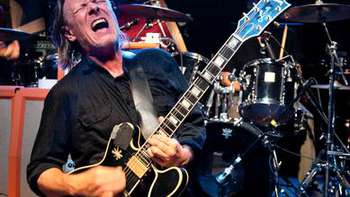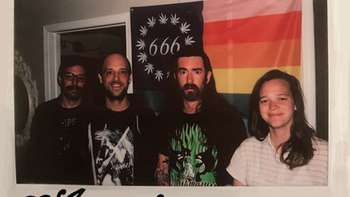Constantly exploring and never stagnant like a mosquito-infested bird bath filled with water, Swans are constantly reevaluating, reassessing and pushing boundaries of sound exploration to heavenly proportions. Pulsating dissonance collaborating with sonic clarity enlightens aural and cognitive perception bringing all closer to the truth and a more powerful entity. Is Michael Gira the high priest of sonic contemplation and reflection leading us through astral planes of truth like a prophet warning of the inevitable? Currently on a major tour, I would invite the reader to explore Swans Live and walk away with a new perception of the live experience. As much as I love Swans’ output, it is seeing them live that opened doors of perception and eradicated any contemplation of doubt in the power attributed to the exploration of sound and noise. I had the opportunity to talk to Gira on his latest project, The Beggar. This is how it unfolded.
Scene Point Blank: Did the process for writing and recording The Beggar follow a similar or a different path to past Swans releases? How do you compose a song? Does the music come first and then the lyrics or vice versa or does each song follow a different formula?
M. Gira: I have faith in intuition. I spend a good deal of time playing the same open chord or chords over and over with my ear down close to the hole in my acoustic guitar, listening for mystery in the overtones, waiting for guidance from the divine entity that lives in the sound. The ultimate recorded arrangement of the songs is already inside the swirl and the resonance and ghost notes that occur in the chords. As to the lyrics, they too come from somewhere that is not me -- I’m really like a ventriloquist’s dummy guided by an unseen hand. I discover the meaning in the songs as I write them.
Scene Point Blank: Does the title reference anything specific, or could it symbolize greater in-depth contemplation to be determined by the listener?
M. Gira: Well I would always hope that the listener would be an active participant in how meaning is formulated. I have, ultimately, very specific implications in mind for each of the songs, but the most wonderful thing to me in art/music/literature is the impossible tension involved in the act of discovery, and it’s best when the object of contemplation is always just out of reach, but still calling. But I will say, in this case, that lately I’m interested in abjection and supplication and humiliation, and what that implies. I think it’s good to strip away the pretense of self, to peel off one’s own skin and find out what’s beneath. I think if you strip things away thoroughly that once you get past the guts and blood you might find that what remains is simply a quickly dissipating puff of cosmic breath.
The volume is used for selfish reasons, really. I want to personally atomize in the sound. I want it to obliterate me. I can’t help myself. I’m addicted to it. My goal is for my limbs and innards to festoon the rafters of whatever venue we’re playing at the time. It’s part of the fun.
Scene Point Blank: Where do you draw lyrical inspiration from? Do they come from many facets of what you encounter/interpret/etc?
M. Gira: Too numerous to mention clearly --from books I read to movies to personal memories to feelings of love and sexual desire or to hatred or to spiritual longing to defeat to disgust to wonderment and sheer amazement at the raw fact of existence, and on…
Scene Point Blank: Initially, how important was punk to you? Were bands like the Screamers, Suicide, and the No-Wave movement influential? Did you actually audition for Flipper?
M. Gira: Yes, I did audition for Flipper, and I failed. Ha ha! So long ago… Punk gave me life but also condemned me to a career of repeated failure and futility. I should have stayed a visual artist or studied law. Anyway, yes The Screamers and especially Suicide were great, more punk than punk, but probably the most enduring influence on me has been Bob Dylan -- not stylistically or lyrically or even musically, but just by example of how the impossible is possible.
Scene Point Blank: Does music bring you closer to a spiritual plane? Does this happen with each live performance or are some more memorable than others? Do you feed off the audience's energy as they do off the band?
M. Gira: Well, frankly, sometimes it’s just a struggle, like climbing up a cliff face with rubber limbs and falling off repeatedly. Other times, the music takes off on its own and leads us closer to God. It’s what I personally live for. I know intuitively that having an audience has something to do with the chemistry of the moment, but I prefer not to think about it. It’s not like I want them to have input, for god's sake. Still, when things are working it’s a communal experience I suppose, and we’re all just flecks of spittle riding a turbulent sea.
Scene Point Blank: How often are you working out new material in front of an audience? How long do you think a Swans song takes to truly develop (or is it always evolving)? I read that you have stated that living and breathing the song is when, as a musician, you can then explore other avenues in playing it live and letting it evolve. Do you see yourself like a conductor in an orchestra and every person plays a specific role in achieving the end result?
M. Gira: I am certainly a conductor if you could consider a person standing on the tracks waving their arms frenetically as a train advances at top speed a conductor, yes…
The music is always evolving. Once that stops, the material is dead. Currently, we’re in the midst of a very long succession of tours and the development of the songs is in a nascent stage, still forming. I’m always looking for what to discard and what to explore instead. It’s a sometimes instantaneous decision, sometimes incremental over time. But it’s important the music always be in a state of flux, at least for me. Otherwise, why do it?
Scene Point Blank: Do you find that space is important to use in composition?
M. Gira: Yes, negative space is extremely important and I don’t use it enough. Thanks for reminding me!
Scene Point Blank:I can think of about 4 bands that I would relegate as the loudest shows I have ever seen (one being the Swans). Is the volume essential to feel the music and become one with it? Having played in a band many moons ago, I knew when we all clicked it felt like one entity creating this sonic force -- it was a high in a sense. When watching live footage it is hard to capture the bottom end, the vibration you feel through your body when the audience and performer become one entity. Do you get different tones with volume?
M. Gira: The volume is used for selfish reasons, really. I want to personally atomize in the sound. I want it to obliterate me. I can’t help myself. I’m addicted to it. My goal is for my limbs and innards to festoon the rafters of whatever venue we’re playing at the time. It’s part of the fun. Also, elements such as sustain, resonance, overtones, and sheer physicality don’t exist sufficiently unless at a proper volume.
Punk gave me life but also condemned me to a career of repeated failure and futility. I should have stayed a visual artist or studied law.
Scene Point Blank: Are there any Swans songs you have never explored playing live but would like to revisit? Do you feel compelled to play songs that you might determine are fan favourites?
M. Gira: Absolutely not, no, never. It would be a disservice to an audience to pander to them in that way. The goal is to make an absolute moment of clarity occur, through sound and the emotions it engenders. I don’t even remember most Swans songs actually. It’s a long blur of muck upon muck at this point. Hopefully, we’re always at the crest of the wave, seeking clear pure air.
Scene Point Blank: Did the onset of COVID cause strain for the Swans or yourself personally? I have spoken to a few musicians who stated that it gave them time to focus and create. However, the antithesis had been stated that there was too much time waiting and the isolation actually had the opposite effect on the individual.
M. Gira: COVID was a horrible interlude and it caused a multitude of deaths and was a great hardship for many. But to me, it’s gone now and I barely remember it. Good riddance.
Scene Point Blank: Is Los Angeles truly the City of Death? (It’s my favourite track on the LP, currently.) What inspired this song? Any specific incidents?
M. Gira: “Los Angeles: City of Death” is a song I wrote, not a sociological exegesis. It’s just a mingling of longing and regret and fantasies I have about the place, the place where I was formed for better or worse. It’s very romantic actually, the sheer apocalypse of the place. But I love it and would move to a house on the beach there in an instant if I had the money. I’d bodysurf every day. I’d love to live the rest of my life without having to wear shoes and feel dried salt on my skin.
Scene Point Blank: Is “Michael Is Done” a self-fulfilling prophecy? Does it explore elements of change?
M. Gira: When my words work they form an ouroboros. I think the words to that song are good, in that they eat themselves. That song was originally called “Julie is Done.” It suddenly made sense to me when I changed Julie to Michael.
Scene Point Blank: Do you find having the role of producer gives you more control over vision and final output compared to handing those reins over to another entity?
M. Gira: At this point, I can’t imagine giving such an important part of the music over to someone else. It’s all part of the job for me: the writing and performing of the songs as well as shaping the sonic environment in which they’ll live. The main flaw I have as a producer is that I take the song too seriously. Sometimes it would be better if I let the inevitable occur and allowed the song to disappear in the sound itself. I think, probably, the best moments are when this has happened.
Scene Point Blank: Are plans in place for the 17th LP release of The Swans?
M. Gira: I have some ideas but they are still in the back of my mind. We have the better part of a year ahead of us touring, so it’s a long way off.
--
Swans live dates for 2023
11 Aug – Brighton UK, St George’s
12 Aug – Manchester UK, Albert Hall
15 Aug – Newcastle UK, Boiler Shop
16 Aug – Glasgow UK, St Luke’s
18 Aug – Bristol UK, Arc Tangent Festival
19 Aug – Leeds UK, Belgrave Music Hall
21 Aug – Dublin IE, The Academy
23 Aug – Norwich UK, Waterfront
24 Aug – London UK, Troxy
26 Aug – La Tour-De-Peilz CH, Nox Orae Festival
2 Sep – Dallas TX, Granada Theater
3 Sep – Austin TX, Paramount Theatre
7 Sep – Phoenix AZ, Crescent Ballroom
8 Sep – Los Angeles CA, Lodge Room
9 Sep – Los Angeles CA, Lodge Room
12 Sep – San Francisco CA, Great American Music Hall
13 Sep – San Francisco CA, Great American Music Hall
15 Sep – Portland OR, Revolution Hall
16 Sep – Seattle WA, The Crocodile Showroom
19 Sep – Omaha NE, Waiting Room Showroom
20 Sep – Minneapolis MN, Fine Line Music Cafe
21 Sep – Chicago IL, Cabaret Metro
23 Sep – Detroit MI, Magic Bag
24 Sep – Cleveland OH, Beachland Ballroom
26 Sep – Toronto ON, Phoenix Concert Theater
27 Sep – Montreal QC, Theatre National
29 Sep – Brooklyn NY, Music Hall of Williamsburg
30 Sep – Brooklyn NY, Music Hall of Williamsburg
16 Oct – Hamburg DE, Kampnagel
17 Oct – Copenhagen DK, Vega Store
19 Oct – Oslo NO, Blå Residency
20 Oct – Oslo NO, Blå Residency
22 Oct – Stockholm SE, Slaktkyrkan
24 Oct – Helsinki FI, Tavastia
25 Oct – Tallinn EE, HALL
27 Oct – Riga LV, Mežaparks Great Bandstand
28 Oct – Vilnius LI, St John’s Church
31 Oct – Warsaw PL, Progresja
1 Nov – Praha CZ, Divadlo Hybernia
3 Nov – Wien AT, Arena Wien
4 Nov – Budapest HU, Akvarium
7 Nov – Belgrade RS, Dom Omladine
8 Nov – Zagreb HR, Kino Sc
10 Nov – Foligno IT, Auditorium San Domenico
11 Nov – Milano IT, Conservatorio di Milano
13 Nov – Paris FR, Élysée Montmartre
14 Nov – Metz FR, Les Trinitaires
16 Nov – Brussels BE, Botanique
18 Nov – Bochum DE, Christuskirche
19 Nov - Den Haag NL, Amare
21 Nov – Berlin DE, Admiralspalast




